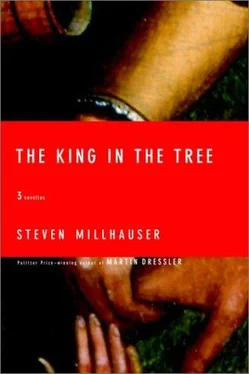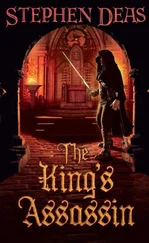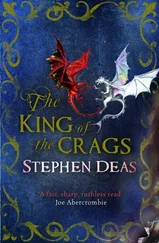It is my duty to lead Oswin back to the castle, after which I am to return and join the King in the tree.
I loathe this plan, which seems to me to carry with it something alien to the King, something that belongs to Oswin, like a borrowed sword.
For my part, I think of the Count of Flanders, who, when a vassal sighed in the presence of the Countess, ordered that the man be beaten and suspended head first in a cesspit.
The King is pleased by his decisiveness, which is nothing but the cunning form assumed by his indecisiveness.
It is very late, but I cannot sleep before setting down the surprising events of this memorable night.
Not long after the King took his leave of the company to return to his bedchamber, I made my way alone to the orchard, where I lay in wait for the King and Oswin not far from the gate in the orchard palisade. I soon saw the gate open and the King and Oswin pass through. I followed, keeping well behind. The moon, a brilliant crescent, was low in the sky — a clear night, dark, with many stars. Oswin did not speak. He led the King silently along wagon paths, through clusters of fruit trees and arbors of grapes, over streams and ditches; in the starlight I saw an abandoned wagon, a pile of empty baskets, a broken wheel with tall grass growing between the spokes. In time we came to an older part of the orchard, where thick-branched apple trees rose high overhead. A narrow brook ran nearby. At the base of an immense apple tree that grew beside the stream, Oswin stopped. One low branch, thick with leaves and small unripe apples, grew out over the stream. Handing his bow and quiver to Oswin, the King with a sudden leap seized a branch and climbed into the tree. Swiftly he concealed himself in the middle branches. Then he reached down for his bow and quiver, which Oswin handed up to him.
“Why are there three arrows, Sire?” Oswin asked.
“The third arrow is for you,” the King replied, “if you fail to return to the castle. Thomas will see you safely to the gate.”
At this I stepped forth. Oswin, outraged, banished all expression from his face and accompanied me in silence back to the orchard gate, where he took his leave coldly. Only when the gate closed did I make my way back through the orchard to the apple tree beside the stream. There I stood looking up at the thick-leaved branches, until the King ordered me to climb up and keep watch with him.
When I was settled not far from him on a neighboring branch, the King said in a whisper, “Tell me, Thomas. When did you last climb a tree?”
At once I saw myself in the orchard of my uncle’s manor, plucking a handful of cherries.
“Forty years ago,” I whispered.
At this the King gave a sudden, disarming grin, a mischievous grin, as it seemed to me, and my heart was moved, for despite the solemnity of the occasion, he was still boyish, in some things.
His mind darkened as we waited. He seemed restless, sorrowful, gloomy with anticipation, half inclined to abandon the grotesque enterprise — for how could he desire to discover what he could not bear to know? And beneath his burst of boyish high spirits, I sensed that he was ashamed to be hiding in a tree, spying on the Queen and Tristan; for he was no comic cuckold in a minstrel’s tale, but King of all Cornwall.
Suddenly Tristan was there, under the tree. I had not heard a sound. Shadow branches showed sharp and black on the moonlit grass. He seemed uneasy and kept pacing, keeping a careful watch in the dark.
At the sound of the Queen’s footsteps I felt the King grow violently still, as if his body were a hand that had closed over a struggling bird.
Tristan did not step forward to meet the Queen. Instead he drew back, almost as if he wished to avoid the meeting. As Queen Ysolt came near I could see her face in the moonlight, anxious and uncertain. She stopped some ten feet from Tristan, who stood directly below us.
“Why have you asked me to come here?” she said, in a cold, majestic voice I had never heard before. I had the odd sensation that I was watching a court play.
“To ask for your help, my lady. Enemies have turned the King against me; God knows the love I bear him. If, in your kindness. .”
So they declaimed, two actors under the moon. For I understood — suddenly and absolutely — that they knew they were being watched, up there in the branches. I felt like leaping down and crying, “Well done, Tristan! A fine speech!” On the ground, among the leaf shadows, I saw the shadow of the King’s face. Tristan must have seen it there and passed a signal to the Queen. So the two played out their little drama under the apple branches: the Blameless Lady and the Injured Knight. It was well acted, though a little long; the speeches, though rather florid, were delivered with strong feeling. And I marveled at the sheer daring of it, the air of impassioned conviction with which they assumed their parts. Of course they were in a trap, fighting to get out. But wasn’t there more to it than that? Tristan truly did love the King, who had taken him into the Cornish court at the age of fifteen and brought him up like a father; the Queen surely considered herself blameless, for she had been married against her will — and in any case, what can one do against the power of Love? And what of the King? Can he really have been deceived? I believe he grasped at the little drama gratefully, eager to be deluded — for the one thing he could not permit himself to find was the truth he sought.
When the two had left — first the blameless Queen, and later, after a proper interval, the melancholy and misunderstood knight — the King said nothing for a long while. Then he turned to look at me from his branch. With passion, with a kind of crazed delight, he whispered, “You see, Thomas! You see!”
“I see our shadows, my lord,” I replied sharply, but the King, with a burst of energy, swung down from the tree and looking up at me cried out, “Come down, Thomas! What the devil are you doing up there? A grown man like you! Come down, Thomas, come down!”
Oswin is in disgrace. The King dotes on the Queen, sings Tristan’s praises, hunts the red deer and the fallow deer and the roe deer, drinks deep from his gold flagon, throws back his head in laughter: all is splendid, all is well. Only I am uneasy. Is it because I detect in the King’s heartiness a note of excess, as if by sheer effort of will he hopes to banish the doubt that devours him? His eyes glitter with a mad merriment. He embraces Tristan, looks admiringly at the Queen. “Thomas!” he cries. “Is she not beautiful?” “Yes, my lord.” The Queen lowers her eyes.
Because the King cannot bear the thought that his wife and Tristan are lovers, he has again placed her under Tristan’s protection. In this way he demonstrates to himself that they are innocent and he is wise — for if they were guilty, he would be a fool to leave them alone together. All morning and afternoon he hunts in the forest, while Tristan attends the Queen everywhere. He walks with her in the garden, climbs the winding stairs that lead to her tower chamber. Oswin is forbidden to be in her presence, on pain of imprisonment. In the early evening, Tristan returns Ysolt to the King. The King and Queen retire early. At night, in the royal bedchamber, I hear cries of lovemaking.
Anyone who reports ill of Tristan or the Queen is threatened with banishment.
It is precisely now, when the Queen and Tristan ought to exercise exceptional caution, that they behave as if the King’s trust, his air of cheerful unconcern, has deceived them. They exchange glances full of longing, flush and grow pale, emerge from hidden chambers drowsy and languorous. When Tristan hands the Queen to the King, his face is full of tender sadness. The Queen, walking beside the King, looks about for Tristan, catches his eye. Are they mad? One might almost think they are trying to provoke the King into punishing them. Is it possible that his inflexible good cheer, his stubborn insistence on being deceived, exasperates them into public shows of affection? Do they feel he is tempting them to see how much he can bear? Or is it that, swept up as they are by an irresistible power, they do not think about the King at all?
Читать дальше












